PROMISCES Blog
Farewell from PROMISCES!
July 4, 2025
42 months, 27 partners, 7 case studies - in May, the PROMISCES project came to an end. In these 3.5 years, we were able to achieve a lot. We put together for you our highlights and a picture gallery To give you a recap of the project.
PFAS Points Part 3: The PROMISCES Layman's Report
June 25, 2025
The PROMISCES Layman’s Report summarizes the key results of the PROMISCES project for the general public. It highlights innovative detection methods, risk assessment tools, and sustainable remediation technologies developed to manage PFAS and to protect human health and the environment. It is based on the 5 PROMISCES objectives:
PFAS Points Part 2: PROMISCES for Policy Makers
May 6, 2025
PFAS are present throughout the environment: in soil, surface water, groundwater, sludge and wastewater. This makes their regulation difficult. To date, various regulations address PFAS in specific matrices, but they do not address the role that PFAS play in working towards a circular economy. PROMISCES has developed several recommendations for policymakers at European and national levels to enhance PFAS management.
Final PROMISCES Consortium Meeting
April 30, 2025
On 23 and 24 April, 2025, we had our final Consortium Meeting in Orléans, hosted by BRGM! During the meeting, the PROMISCES results and innovations were presented to the partners and guest. Further, there were project intern discussions about the achievements, challenges and suggestions for further investigation encountered during the 3,5 years of the project. The consortium also had the chance to visit the Case Study 6 pilot that investigated fate, transport and (bio)remediation of soil and groundwater contaminated by PFAS from firefighting foams.
PROMISCES Day For French Audience
April 30, 2025
On 22 April, 2025, BRGM and PROMISCES French partners (BRGM, Ineris, IPGP, SinapTec, COLAS) organized a seminar in Orléans, introduced by representatives from the French Ministry’s “Plan Interministeriel PFAS.” The seminar was held in French.
PROMISCES Young Researchers: Tobias Hensel
April 16, 2025
In PROMISCES, many young researchers are working in a wide variety of fields. But one thing they have in common: To enable a circular economy in the soil-sediment-water system and to fight PFAS. One of them is Tobias Hensel. He is a PhD candidate at Berliner Wasserbetriebe and deeply committed to fostering awareness and education in the field of pollutants likes PFAS.
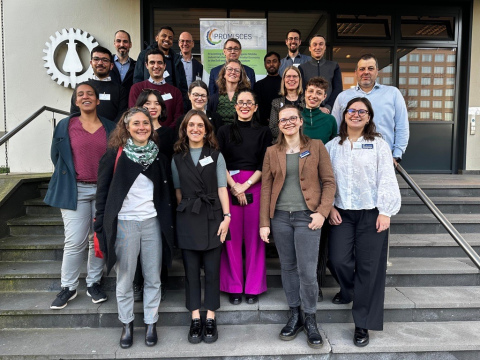
PROMISCES Final Roll-out Event
April 8, 2025
On 27th and 28th of March, the PROMISCES Final Roll-out Event took place in collaboration with the NICOLE Spring Workshop 2025. The topic was "Working towards solutions for emerging, persistent mobile industrial contaminants - Circular Economy in the Soil-sediment-water system". Read the article to find out more and to view te picture gallery.
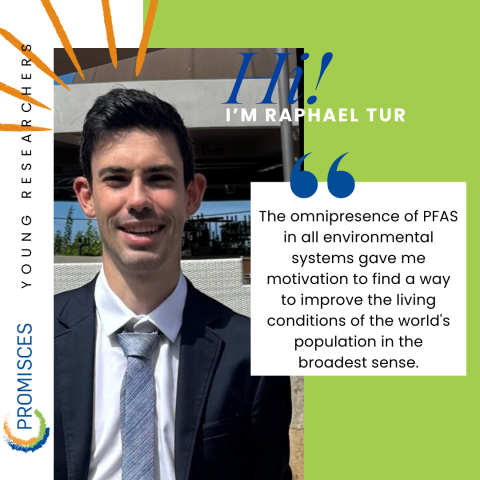
PROMISCES Young Researchers: Raphael Tur
April 7, 2025
In PROMISCES, many young researchers are working in a wide variety of fields. But one thing they have in common: To enable a circular economy in the soil-sediment-water system and to fight PFAS. One of them is Raphael Tur. He is a PhD student at COLAS Environment. Working with PFAS made him aware of the major global problems surrounding PFAS and their dangers for humans and the environment.
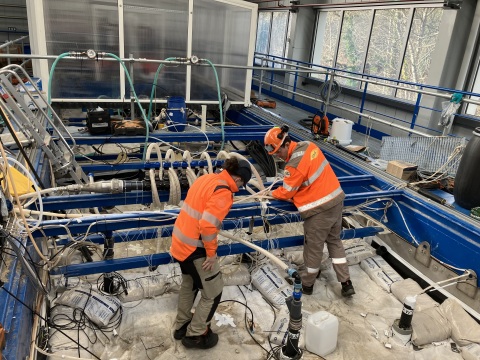
Case Study 6: Study of PFAS migration and remediation in a PluriMetrics experimental pilot
March 13, 2025
In PROMISCES' Case Study 6, PFAS migration and remediation in a PluriMetrics experimental pilot are investigated. The plurimetric experiment involved a pilot (5.2 m long, 3.6 m wide, and 3 m deep) located at BRGM (Orléans, France). The goal was to simulate PFAS contamination from AFFF (aqueous film-forming foam) in a soil-groundwater continuum, mimicking soil and groundwater contamination followed by the demonstration of several remediation technologies trains at a semi-real scale. The experiment lasted eleven months, nine of which were devoted to observing PFAS migration in the soil, with a focus on vertical infiltration in the soil, unsaturated zone, and horizontal transport in the saturated zone. The remediation stage lasted two months.

Thesis Defense: Analytical development and fate of PFAS in complex matrices: application to wastewater treatment plant and their recovery products
March 13, 2025
The PROMISCES project also includes many doctoral students. One of them, Babatoundé Idjaton, has now successfully defended his doctoral thesis on 18th December 2024, in Paris. The title of the thesis is "Analytical development and fate of per- and polyfluoroalkyl substances (PFAS) in complex matrices: application to wastewater treatment plant (WWTP) and their recovery products". Babatoundé Idjaton is a doctoral researcher in the field of Environmental Analytical Chemistry at Bureau de Recherches Géologiques et Minières and Institut de Physique du Globe de Paris (IPGP).
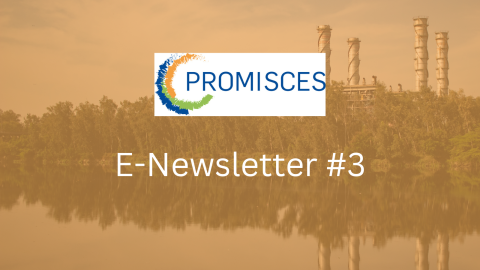
Newsletter #3 Editorial: Recent Results and Impacts
March 13, 2025
The PROMISCES project is now in its third and final phase. Over the past 12 months, significant progress has been made! Our coordinator Dr. Julie Lions (French Geological Survey) takes a look back:
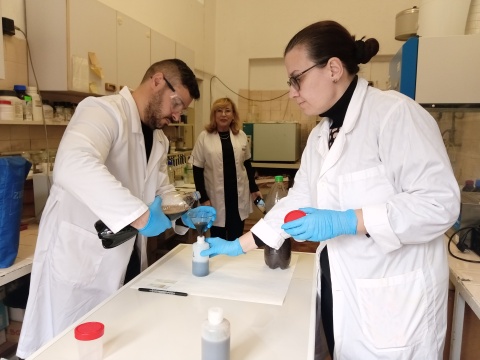
UNI SOFIA: Plasma-Based Treatment for Reducing the Toxicity of PFAS-Contaminated Landfill Leachate
March 13, 2025
The team of Sofia University St. Kliment Ohridski (UniSofia) continued the work in the field of creating, testing and validating new methods for the determination of the complex toxicity of PFAS and PFAS-enriched landfill leachate. The assessment was carried out in parallel with fluorescent methods, which take into account the percentage of metabolically active cells of the bacterial indicator Escherichia coli and the intensity of fluorescence.
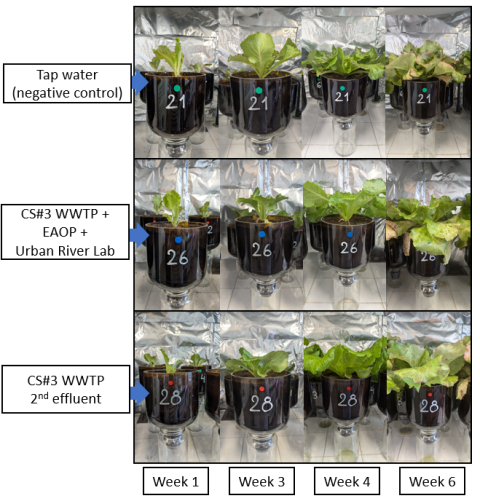
Case Study 3: Study of the uptake contaminants in vegetable crops irrigated with reclaimed water
March 13, 2025
In recent decades, water scarcity has escalated due to climate change and increasing water consumption by the human population. To mitigate this, reusing treated water from secondary wastewater treatment plants (WWTPs) for crop irrigation has gained popularity. PROMISCES has undertaken a study to assess the effects of this practice. This study has quantified PMT uptake by lettuce irrigated with reclaimed water, comparing it with crop uptake factors for PFAS and other iPM(T)s.
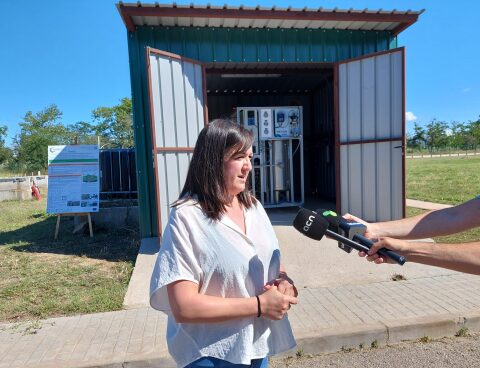
Consorci Besòs Tordera presented the water regeneration pilot within Case Study 3 of the European project PROMISCES
March 13, 2025
On June 21st, 2024, the PROMISCES partners from Consorci Besòs Tordera invited interested parties to a visit and presentation of the water regeneration pilot, installed at the Montornès del Vallès Wastewater treatment plant (WWTP). This pilot plant has been in operation since April 2024, focusing on eliminating complex industrial pollutants to obtain a source of regenerated water for different uses, especially agricultural ones.
New Paper From QSAR Lab: PFAS as EDCs - Identification of compounds with high potential to bind to selected terpenoids nuclear hormone receptors
March 13, 2025
The PROMISCES Team from QSAR Lab (Natalia Buławska, Dr. Eng. Anita Sosnowska, Dominika Kowalska, Dr. Maciej Stępnik, and Prof. Tomasz Puzyn) published a paper entitled “PFAS (per- and polyfluorinated alkyl substances) as EDCs (endocrine-disrupting chemicals) - Identification of compounds with high potential to bind to selected terpenoids NHRs (nuclear hormone receptors)”.
The case study examines the probability of PFAS binding to various NHRs (nuclear hormone receptors). It identifies the structural features contributing most to the binding score (BS).
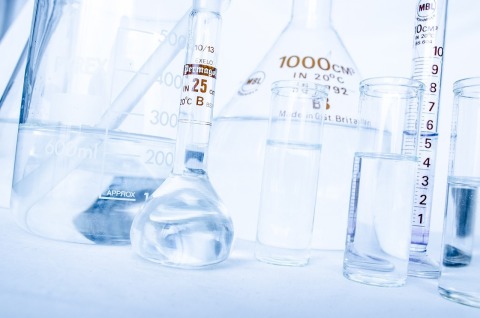
UBA: Starting from testing individual PFAS substances to real, complex PFAS-contaminated water samples
March 13, 2025
As part of PROMISCES, the German Environment Agency (UBA) has co-developed a suitable test battery that is animal-free and cell-based. With it, 44 individual PFAS substances were tested. The TTR-TR CALUX showed the best results of all biotests used in the test battery. It indicates an inhibiting effect on the binding of a thyroid hormone (T4) to the corresponding transport protein transthyretin (TTR) in almost 80 % of the examined PFAS.

UNIVPM: Integrated Treatment of Landfill Leachate Treatment Plant Effluent and Sludge for PFAS Removal and Resource Recovery
March 13, 2025
If high PFAS loads from landfill leachates are reaching municipal Wastewater Treatment Plants (WWTPs), they prevent proper treatment and ultimately hinder zero pollution discharge and further water reuse due to higher PFAS discharges from WWTPs. Currently, PFAS-contaminated sewage sludge and Reverse Osmosis (RO) concentrate from landfill leachate treatment are transported to incineration plants or disposed of in waste landfills. However, these practices are not sustainable and do not aim to recover resources.
The approach of the Marche Polytechnic University (UNIVPM) was designed to treat PFAS contamination in multiple stages.
PROMISCES Young Researchers: Ali Obeid
March 6, 2025
In PROMISCES, many young researchers are working in a wide variety of fields. But one thing they have in common: To enable a circular economy in the soil-sediment-water system and to fight PFAS.
One of them is Ali Obeid. He is a PhD candidate at the Technical University Vienna (TU Wien). He believes that every contribution, no matter how small, can make a meaningful impact
Read more about Ali and his motivation to work in PROMISCES in the interview!
PROMISCES Young Researchers: Dana Pierina Orlando
February 19, 2025
In PROMISCES, many young researchers are working in a wide variety of fields. But one thing they have in common: To enable a circular economy in the soil-sediment-water system and to fight PFAS.
One of them is Dana Pierina Orlando. She is a PhD student at the public scientific institution of reference in Spain (IDAEA-CSIC). What excites her the most is contributing that bit of data that could influence environmental policies and water treatment practices.
Read more about Dana and her motivation for working in PFAS research in our interview!
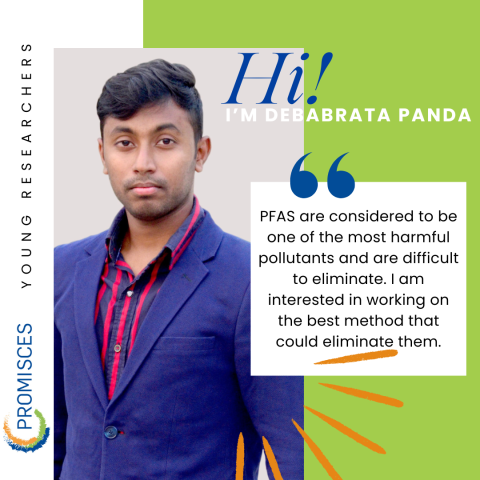
PROMISCES Young Researchers: Debabrata Panda
January 29, 2025
In PROMISCES, many young researchers are working in a wide variety of fields. But one thing they have in common: To enable a circular economy in the soil-sediment-water system and to fight PFAS.
One of them is Debabrata Panda. He is a postdoctoral researcher at the Institut de Physique du Globe de Paris (IPGP). His motivation is to work on the best method that could eliminate PFAS.
Read more about Debabrata and his motivation to work in PROMISCES in the interview!
.png)
PROMISCES Young Researchers: Ali Batikh
January 8, 2025
In PROMISCES, many young researchers are working in a wide variety of fields. But one thing they have in common: To enable a circular economy in the soil-sediment-water system and to fight PFAS.
One of them is Ali Batikh. He is a Ph.D. researcher with a focus on PFAS In-situ soil and groundwater remediation at COLAS ENVIRONNEMENT. What excites him the most about the work in PROMISCES is contributing to a meaningful change in the protection of the environment.
Read more about Ali and his motivation for working in PFAS research in our interview!
.png)
PROMISCES Young Researchers: Alicia Cano Lopez
December 4, 2024
In PROMISCES, many young researchers are working in a wide variety of fields. But one thing they have in common: To enable a circular economy in the soil-sediment-water system and to fight PFAS.
One of them is Alicia Cano Lopez. She is a pre-doctoral researcher in the field of Environmental Analytical Chemistry at the Institute of Environmental Assessment and Water Research (IDAEA-CSIC). What excites her the most about the work in PROMISCES is the potential to contribute to significant environmental improvements and to provide solutions that can enhance the well-being of communities around the world.
Read more about Alicia and her thoughts about PFAS in reused water in our interview!

PFAS Points Part 1: What are PFAS?
November 26, 2024
In our new series PFAS Points, we want to introduce you to the topic of PFAS: What are PFAS? Why are they so dangerous? What is being done about them? And how does PROMISCES support the fight against PFAS? Welcome to part 1: What are PFAS?
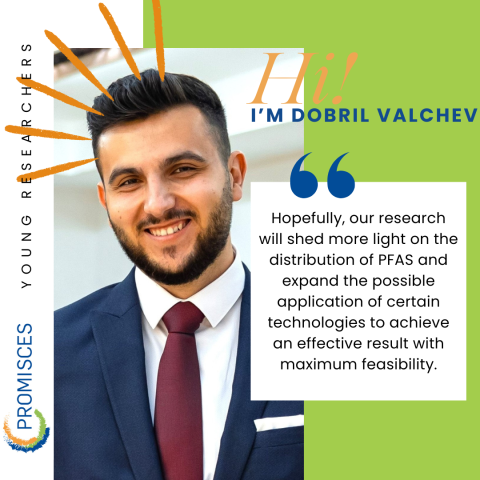
PROMISCES Young Researchers: Dobril Valchev
November 6, 2024
In PROMISCES, many young researchers are working in a wide variety of fields. But one thing they have in common: To enable a circular economy in the soil-sediment-water system and to fight PFAS.
One of them is Dobril Valchev. He is a Chief Assistant Professor at the University of Architecture, Civil Engineering and Geodesy in Sofia, Bulgaria. With his research, he wants to shed a light on the distribution of PFAS.
Read more about Dobril and his motivation to work in PROMISCES in our interview.
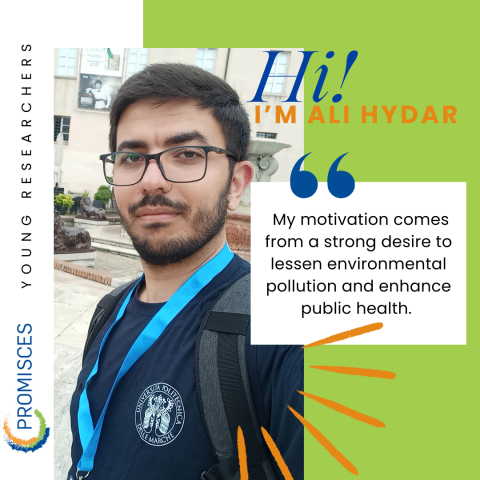
PROMISCES Young Researchers: Ali Hydar
October 9, 2024
In PROMISCES, many young researchers are working in a wide variety of fields. But one thing they have in common: To enable a circular economy in the soil-sediment-water system and to fight PFAS.
One of them is Ali Hydar who is working as a research fellow in the WWEELab Research Gruop at Università Politecnica delle Marche. His motivation for working in this sector comes from a strong desire to lessen environmental pollution and enhance public health.
Read more about Ali and his motivation for working in PFAS research in our interview!
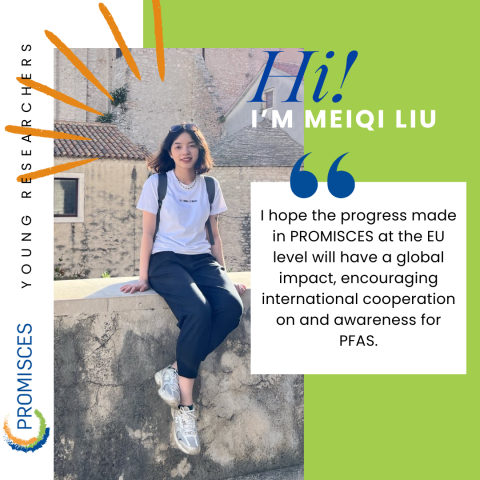
PROMISCES Young Researchers: Meiqi Liu
September 3, 2024
In PROMISCES, many young researchers are working in a wide variety of fields. But one thing they have in common: To enable a circular economy in the soil-sediment-water system and to fight PFAS.
One of them is Meiqi Liu. She is a PhD student and is working as project assistant at TU Wien. She hopes that the progress made in PROMISCES at the EU level will have a global impact on international cooperation and awareness.
Read more about her motivation to work in PROMISCES and her thoughts on PFAS research in our interview.
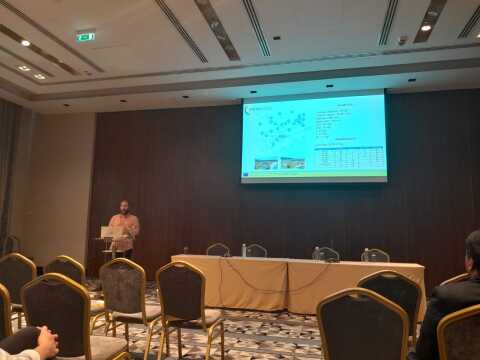
PROMISCES at the Nature-Based Solutions for Water Security and Climate Adaptation conference
July 19, 2024
The Nature-Based Solutions for Water Security and Climate Adaptation conference held in Belgrade from 3rd to 5th July, 2024, aimed to break with the traditional interventions for the reduction of hydro-meteorological risks, such as grey infrastructures. Toni Mas i Ponce from our partner Consorci Besòs Tordera was at the conference. He talked about the application of innovative technology based on Electrochemical Advanced Oxidation Process (EAOP) combinated with a nature-based post-treatment for water reuse. He also presented Case Study 3.
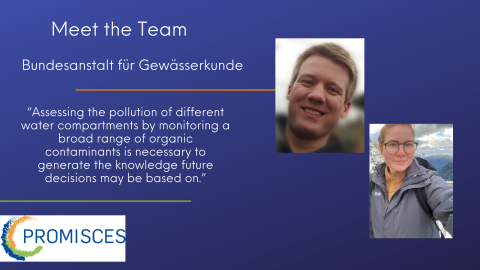
Meet the Team: Bundesanstalt für Gewässerkunde (BfG)
June 19, 2024
The German Federal Institute of Hydrology (BfG) is involved in severel Workpackages of the PROMISCES project and is also part of Case Study 1 in Berlin and Case Study 2 in the Danube catchment area. Here, they are responsible for performing suspect screening for over 1,500 organic contaminants in aqueous water samples. Read the interview to learn why this task is so important for the future.
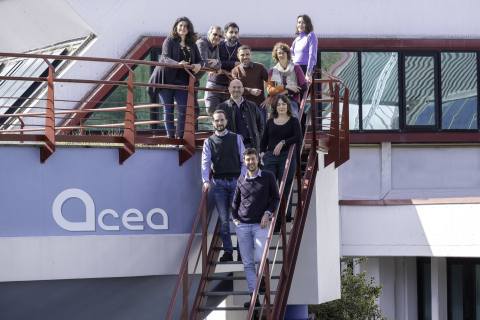
Meet the Team: Acea
June 6, 2024
Acea is involved in different tasks in the PROMISCES project. They develop analytical methods for PFAS on complex matrices and their application in two case studies and apply the developed methods on a port sediment matrix and on leachate, sludg and permeate matrices. What are their goals? How is their work important for the general public? Read more in our interview!
.png)
Local Stakeholder Workshop for the Marche & Lazio Regions
April 23, 2024
On April 19, 2024, the co-creation workshop for PROMISCES Case Study 4 took place in Rome, Italy, at the infrastrucutres of our partner Acea. Around 20 participants from different sectors, e.g. industry, waste, public health, environment and water operators, came together for the workshop on "developing a system-wide, zero pollution strategy to support management of landfill leachate".
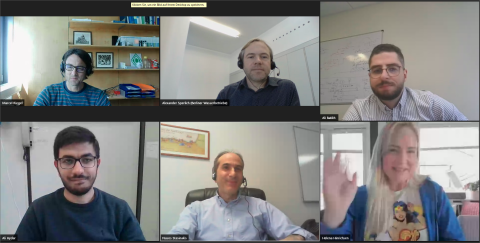
Remediating Contaminated Sites by Persistent, Mobile, and Toxic Substances: H2020 Projects Case Studies & Results
April 16, 2024
On April 10, the joint webinar on “Remediating Contaminated Sites by Persistent, Mobile, and Toxic Substances: H2020 Projects Case Studies & Results” took place. The webinar was a collaboration with our sister projects ZeroPM and SCENARIOS. It was organised with the help of the Horizon Results Booster. The projects tackle the health risks posed by Persistent, Mobile, and Toxic Substances.
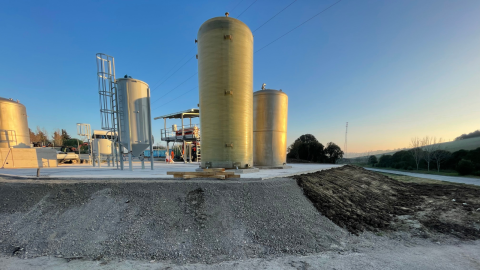
UNIVPM: ECOSEDRA Pilot Plant to Remove PFAS from Dredged Sediments and Recover Material for Road Construction
April 16, 2024
In the PROMISCES project, the Universitá Politacnica delle marche (UNIVPM) implemented a prototype plant for mechanical sediment treatment, designed as a part of the Italian project ECOSEDRA. With the plant, partners of PROMISCES undertook investigations to understand how PFAS compounds behave during the mechanical operations and washing processes conducted by the ECOSEDRA pilot plant.
%20-%20Photo%20by%20Thomas%20Oudega.jpg)
TUWien: Monitoring of PFAS at River Bank Filtration sites in Vienna and Budapest
April 16, 2024
One of the most important transport routes of PFAS to drinking water is through riverbank filtration (RBF). Although this is usually an effective strategy for removing many organic compounds, its effectiveness in removing PFAS is still unknown. The aim of TU Wien and other partners in Case Study 2 is to improve this knowledge to secure the safety of drinking water. TU Wien started by setting up a monitoring campaign in both Vienna and Budapest.
_photo%20credit%20-%20Simon%20Varsano.jpg)
Sofia University: Assessment of impaired biological activity during the landfill leachate treatment and toxicity reduction by plasma treatment
April 16, 2024
Sofia University created and repeatedly applied a test to evaluate the toxicity of the complex pollutant PFAS, of leachate and of leachate with the addition of PFOA. The test is based on an assessment of the reduced biological activity of a standardized 18-hour test bacterial culture of Escherichia coli due to the impact of different toxic pollutants.
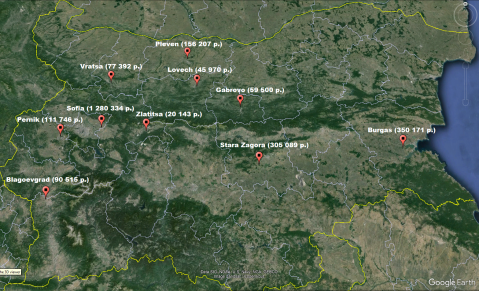
Sofia University: Study Reveals PFAS Concentrations in Bulgarian Landfills within European Range
April 16, 2024
A recent study conducted by Sofia University analysed approximately 20% of Bulgaria's officially registered sanitary landfills, which collectively manage 35% of the country's annual landfill waste, in terms of PFAS concentration and types.
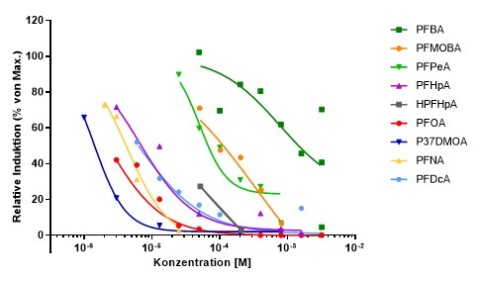
Umweltbundesamt: The selection of the most suitable bioassays for PFAS detection
April 16, 2024
In PROMISCES, the German Environment Agency (Umweltbundesamt, UBA) has been tasked to assess the toxicity of PFAS and PMT substances in laboratory experiments. Based on previous experiments, 44 PFAS were selected to perform with different bioassays. The research indicated that TTR-TRβ CALUX bioassay showed the most promising results regarding detection of PFAS.

QSAR Lab: New publication on environmental impact of PFAS
April 16, 2024
The QSAR Lab team was working on a publication addressing crucial gaps in environmental properties of per- and polyfluorinated alkyl substances (PFAS). Due to limited comprehensive testing, the availability of experimental data remains limited. To tackle this challenge, a novel approach combining physics-based methods and data-driven models was employed.

QSAR Lab: Presentation of Structure-based approach for predicting toxicity of PFAS
April 16, 2024
Dr. Eng. Anita Sosnowska from QSAR Lab gave a talk on the second online webinar on “Models for Toxicology” – In-silico models in toxicology: Approaches and evidence. It took place on 31 January, 2024. The Webinar was organized by ALTERNATIVE, a sister project of PROMISCES.
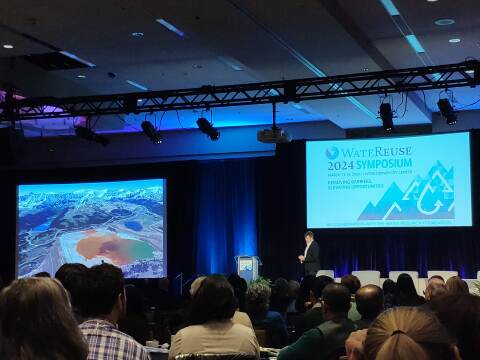
KWB: Up and running - The human health exposure assessment (HHEA) model
April 16, 2024
Through a risk-based exposure assessment approach, the potential chemical exposure associated with critical circular economy goals like water reuse for agricultural irrigation, drinking water treatment, groundwater remediation, and nutrient recycling can be evaluated. The human health exposure assessment model, developed in PROMISCES by KWB and EURECAT, enables users to do just that
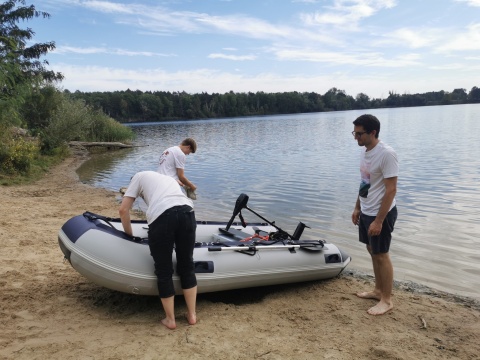
KWB: Stormwater runoff monitoring and sampling of receiving lake
April 16, 2024
The monitoring of stormwater runoff from two different industrial sites is part of the Berlin case study (CS#1). As planned, Kompetenzzentrum Wasser Berlin (KWB) completed the monitoring activities at the end of November 2023. Over the eight months of monitoring, which began in April 2023, 25 storm events were sampled at both sites and analysed for PFAS, other industrial compounds, and pesticides at the laboratory of Berliner Wasserbetriebe (BWB).
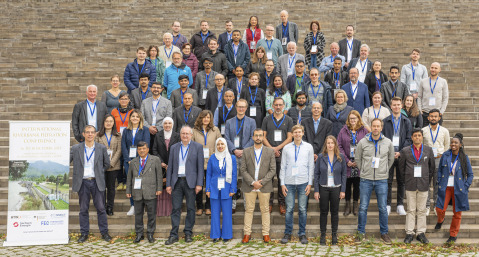
KWB: Development of a generic riverbank filtration model for PFAS and PMT substances
April 16, 2024
Kompetenzzentrum Wasser Berlin (KWB) developed a generic model for simulating the attenuation of PFAS and persistent, mobile and potentially toxic compounds (PMT) during riverbank filtration (RBF). The model is designed to represent the attenuation of chemicals traveling from rivers to drinking water wells.
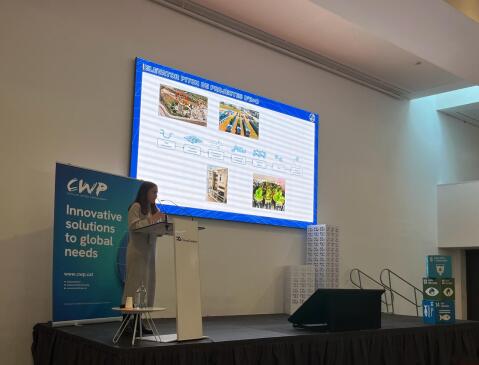
CBT: PROMISCES at the „Water Innovation Day” of the Catalan Water Partnership
April 16, 2024
On February 14, 2024, Maria José Muñoz from PROMISCES partner Consorci Besòs Tordera (CBT) presented Case Study 3 at the “Water Innovation Day”. The event was organized by the Catalan Water Partnership (CWP) whose objective is to promote the transfer of knowledge around technological innovations and R&D for the sustainable use of water in the region Catalonia in Spain.
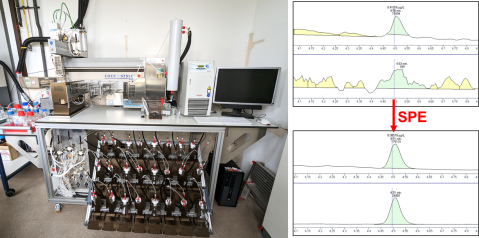
BWB: How to find the least concentrated PFAS
April 16, 2024
One focus of the PROMISCES project is to analyze industrial trace substances in different water matrices. These substances are currently the subject of scientific and political debate. Berliner Wasserbetriebe (BWB) is developing a method that on the one hand minimizes the influence of matrix effects and, on the other hand, concentrates the analytes in a sample.
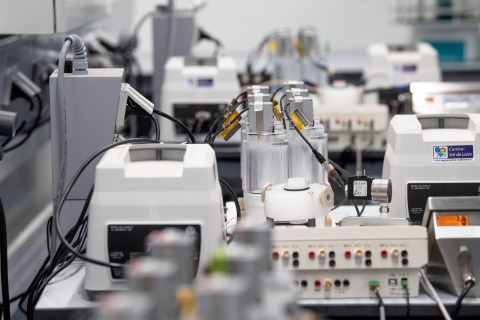
BRGM: PFAS contaminated site - fate, transport and remediation of soil and groundwater contaminated by AFFFs
April 16, 2024
Case Study 6 aims to assess the fate and migration of PFAS from contaminated soil by aqueous film forming foams (AFFF) to groundwater. It also aims to develop innovative, sustainable, and cost-effective technologies for the PFAS treatment of contaminated soil and groundwater. To achieve this ambitious objective, BRGM has conducted experimental works at laboratory scale.
.jpg)
Steering Committee in Barcelona
April 2, 2024
From 19 - 20 March 2024, the PROMISCES partners came together in Barcelona (Spain) for the Steering Committee Meeting. The meeting was organized by our partners from EURECAT and the project coordinator BRGM. What did we do there? What were the outcomes? Read our report!
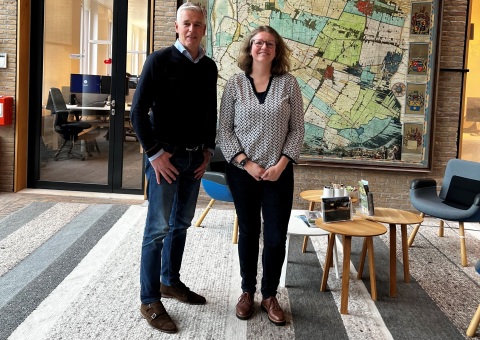
Meet the Team: Delfland
February 28, 2024
In PROMISCES, Delfland's goal is to obtain a solid sampling and analysis protocol for streams derived from the wastewater treatment process, such as sludge, struvite and effluent. They also aim to provide an open access course with accessible information for involved but not yet informed colleagues working in the water cycle. Why is this so important? Read more in the interview!
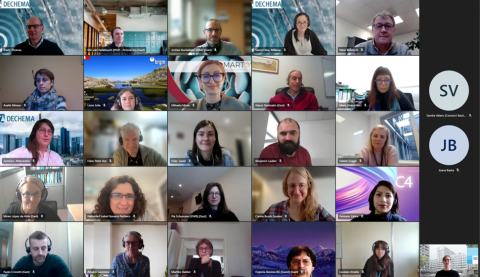
Successful kick-off meeting for CEN Workshop Agreement on “Soil-sediment-water system - Solutions to deal with PMT/vPvM substances”
February 15, 2024
The initial meeting for the CEN Workshop Agreement on "Soil-sediment-water system - Solutions to deal with PMT/vPvM substances” took place. About 30 participants had a chance to get a deeper insight on what the CWA is about, an overview about the involved projects and what is awaitng them during this process.
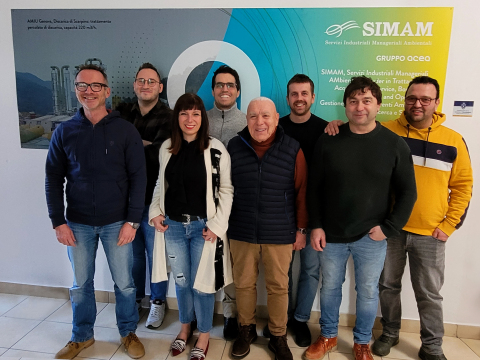
Meet the Team: SIMAM
February 15, 2024
In PROMISCES, SIMAM is contributing to Case Study 4. Here, they are not only contributing with their experience in the definition of the treatment schemes and subsequent realization of customized plants. SIMAM also defined, designed and installed a Reverse Osmosis/Nanofiltration (RO/NF) pilot plant. This will be used to carry out the experimental phase that will quantify PFAS removal differences in RO/NF treatment. Read more about their work in the interview.
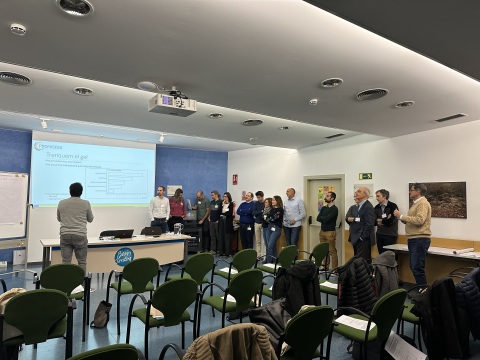
Local Stakeholder Workshop for the Besòs River Basin
January 18, 2024
Together with the PROMISCES partners from EURECAT and Consorci Besòs Tordera, we initiated the co-creation of a zero-pollution strategy. On November 28, 2023, a group of over 25 local stakeholders in the water reuse realm gathered for a first workshop near Barcelona. They were from many different fields, but had one objective: To develop a system-wide, zero-pollution strategy to support the use of reclaimed water for agricultural irrigation.
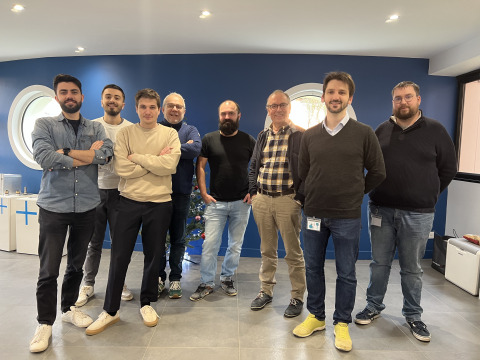
Meet the Team: SinapTec
January 17, 2024
In PROMISCES, SinapTec is involved in Work Package 3 which aims to degrade PFAS compounds. One of their tasks is to design ultrasonic systems that can offer a chemical effect on PFAS. What else do they do in PROMISCES? What are their goals? And why are ultrasonic systems so important? Read more in the interview.
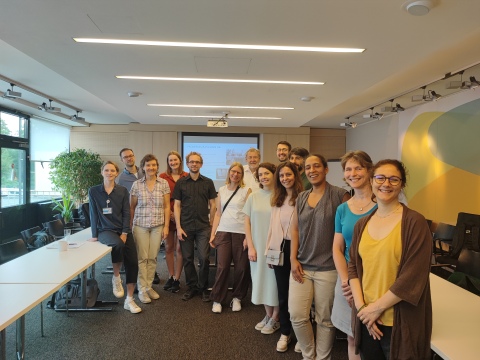
Review Meeting in Berlin
July 24, 2023
From July 11-12, 2023, the PROMISCES partners met in Berlin for the Review Meeting. Read here what we did, besides presenting the project results from the first 18 month.
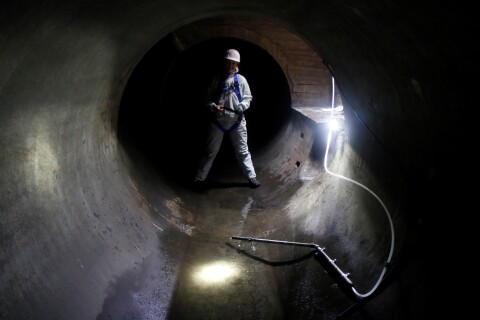
Stormwater runoff & PFAS - installation of sampling equipment at the Berlin case study site
July 3, 2023
To prepare for the PFAS and iPMT compound monitoring in stormwater runoff starting in spring 2023, a team from Kompetenzzentrum Wasser Berlin (KWB) and Berliner Wasserbetriebe (BWB) recently installed the sampling and measuring devices on site in Berlin.
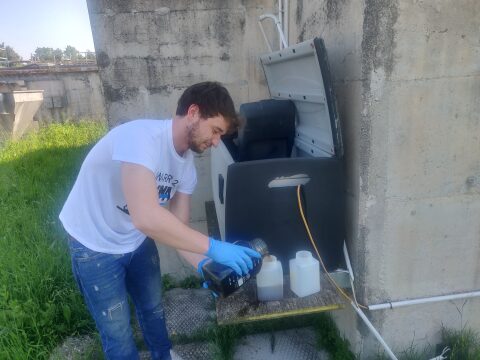
Assessment of PFAS pathways during landfill leachate treatment
July 3, 2023
Partners of the Italian cluster of the EU project PROMISCES are focusing their research activities on the investigation of the removal of PFAS during conventional and advanced treatments of landfill leachate to assess possible pathways for environment contamination. Particularly, new technological solutions will be developed to completely eliminate these compounds from solid and liquid matrices.
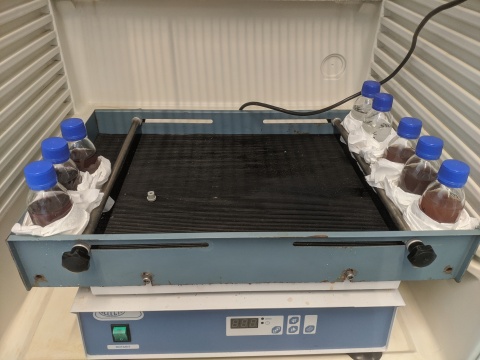
Chemical treatment technology selection for the degradation of halogenated pollutants and PFAS in groundwater
July 3, 2023
Aquifers are very important as source of drinking water. However, they often suffer from overexploitation and/or chemical contamination. In PROMISCES Case Study 7 (Remediation of groundwater in Spain) addresses this issue in two independent sites situated in the north of Spain.

Latest evolution of chemical and toxicological analysis methodologies
July 3, 2023
Work Package (WP) 1 will develop and validate chemical and toxicological methods and strategies for the implementation in PROMISCES activities. In the initial phase, the partners from WP 1 focused on implementing the essential components of the analytical methods required for the project.
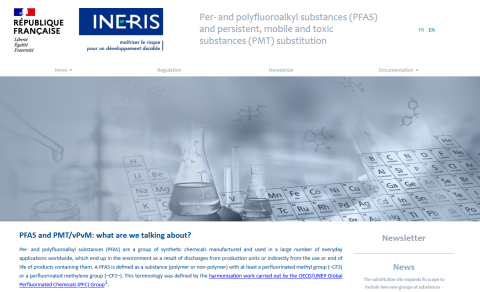
New portal on PFAS and PMT substitution
July 3, 2023
Since 2013, Ineris has hosted the “Chemicals substitution” website substitution.ineris.fr. This website provides support to economic operators engaged in a substitution approach and promotes the dissemination of information and relevant tools. It has now been extended with a portal on PFAS and PMT (persistent, mobile and toxic substances) substitution.
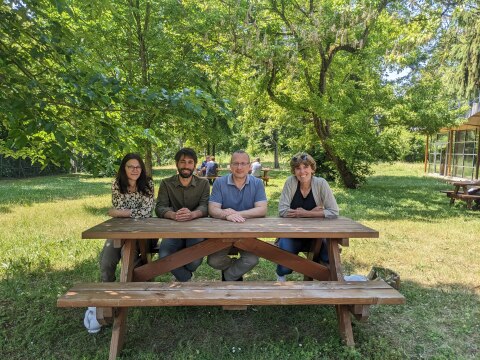
Meet the Team: INERIS
June 16, 2023
INERIS is the co-leader of Work Package 5 and is therefore working on the Decision Support Framework which maps PMTs, offers solutions at different places in the PM(T) life cycle and supports co-creation of risk management strategies for different PM(T)-use combinations. They are also contributing to Work Package 1 which develops a novel QSAR modelling. What are their goals? And how does their work help the general public? Find out in the interview!
Meet the Team: Università Politecnica delle Marche
May 25, 2023
As leader of two Case Studies, UNIVPM has several tasks in PROMISCES. But their goal is clear: To develop innovative technological approaches to avoid the spreading of PFAS so that construction material as well as water and sludge for the agriculture can be reused. Find out more about UNIVPMs tasks an read the wohle interview!
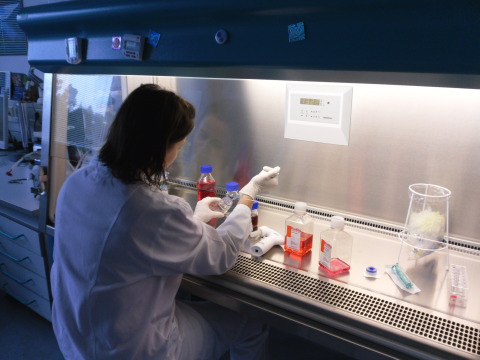
Assessing the toxicity of PFAS and other PMT substances
May 22, 2023
In PROMISCES, the German Environment Agency (Umwelt Bundesamt – UBA) has the task of assessing the toxicity of PFAS and other PMT substances. This is important e.g. for the other PROMISCES partners for evaluating the successes of their water treatment in the case studies. For the toxicological assessment, the UBA has drawn up a list of relevant chemicals. In the end, 44 PFAS, 3 PFAS mixtures and 17 PMT substances were selected
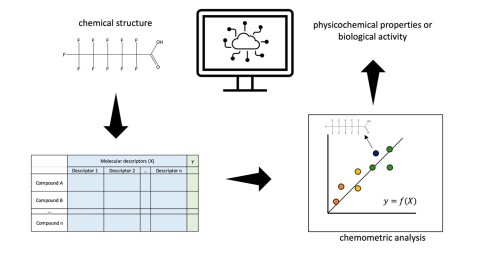
Towards higher scientific validity and regulatory acceptance of predictive models for PFAS
May 19, 2023
There are nearly 5000 PFAS that have been registered and/or produced, resulting in their widespread presence in the environment. But what impact do these chemicals have on human health and the environment? And how can this impact be assessed? QSARLab wants to find out more and has analzyed 38 in silico QSAR/QSPR models in a study
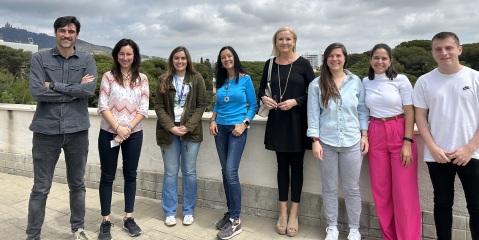
Meet the Team: IDAEA-CSIC
May 11, 2023
One of IDAEA-CSIC's goals is to make the reuse of treated wastewater a safe and regular practice. In PROMISCES, they contribute to Case Study 3 and 7, for example by evaluating new treatments for elimination of industrial pollutants, including PFAS and organochlorine solvents, from water. Read the whole interview to find out more about their goals and their work in PROMISCES.
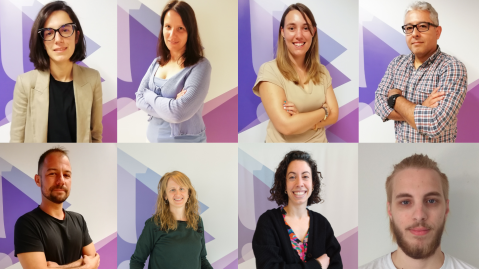
Meet the Team: eurecat
April 20, 2023
In PROMISCES, eurecat is working on case study 3 and case study 7. Therefore, they have two goals: to reuse wastewater in such a way that it can be used to irrigate crops and to develop innovative and sustainable technologies to depollute groundwater and wastewater. How does this contribute to stop restrictions on water consumption in dry areas? And why are quality requirements for groundwater so important? Read the whole interview to find out more.
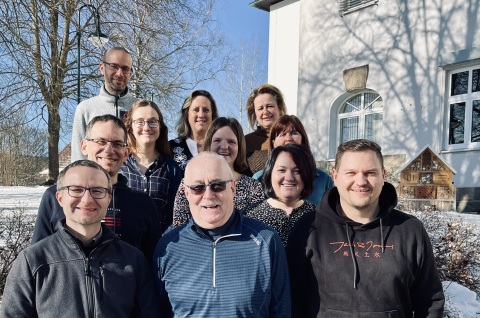
Meet the Team: Umwelt Bundesamt
March 30, 2023
The German Environment Agency (Umwelt Bundesamt) wants to protect drinking water by providing a more sensitive and robust toxicity assessment of PFAS and PM(T) substances. How do they want to reach this goal? And why is this so important? Read the interview to learn more about their work within PROMISCES and how they support the 6 case studies.

Steering Committee in Ancona
March 29-31, 2023
From 29-31 March 2023, the PROMISCES partners came together in Ancona (Italy) for the Steering Committee. The Meeting was organized by our partners from Università Politecnica delle Marche. What did we do there? What were the results? Read our report!
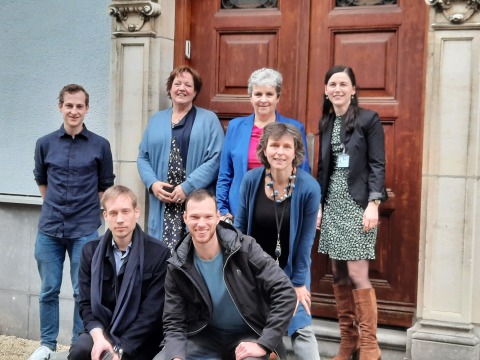
Meet the Team: RIVM
March 16, 2023
RIVM, the Dutch National Institute for Public Health and the Environment, is the co-leader of WP2 and WP5. In this function, they have many different tasks. They work, e.g., on in silico approaches for the assessment of properties of PM(T) substances and help developing a dicision support framework for the risk management of PM(T) substances. Read the interview to learn more about RIVM’s tasks and their role in the project.
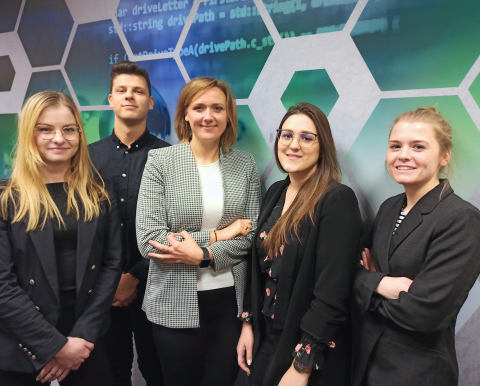
Meet the Team: QSAR Lab
March 9, 2023
QSAR Lab aims to improve the risk assessment of PFAS and other PM(T) substances. To reach this goal, they develop computational methods for monitoring PFAS in the environment and managing the risk they pose for the environment and human health. How do these methods work? And how do they improve the risk assessment? Find out in our interview with QSAR Lab.
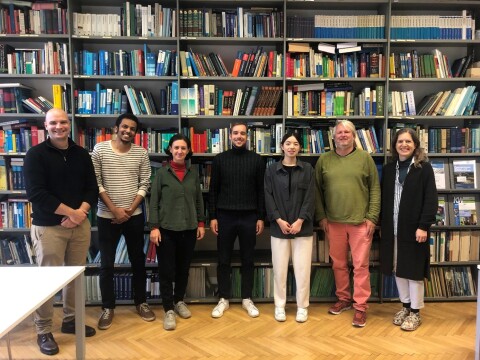
Meet the Team: TU Wien
March 2, 2023
One problem with PFAS and other persistent and mobile chemicals is that there is only little knowledge about them. Therefor, the goal of TU Wien within PROMISCES is to provide a knowledge base to control pollution levels in rivers that are a source for drinking water. How do they do this? And what other tasks does TU Wien have in the project? Read the whole interview.
.jpg)
Meet the Team: French Geological Survey (BRGM)
February 16, 2023
As coordinator of PROMISCES, BRGM is involved in different tasks within the project such as developing analytical methods for the determination of PFAS. They are also the leader for the case study on PFAS fate and transport to groundwater from AFFF (aqueous fire-fighting foam). What other tasks does BRGM have? What do they like about the project? Read more in our interview.
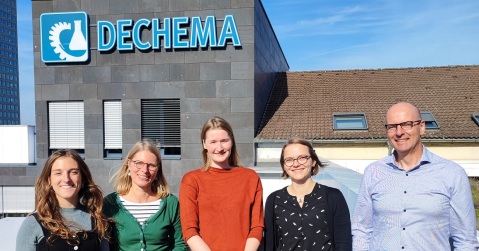
Meet the Team: DECHEMA e.V.
February 2, 2023
As the leader of Work Package 6, DECHEMA e.V. is responsible for the communication, dissemination and exploitation of the project’s results to the identified target groups. They also support the other partners in dealing with stakeholder engagement. Read the whole interview to learn more about how DECHEMA communicates for PROMISCES and how communication helps to improve the health of citizens and the environment.

Meet the Team: Consorci Besòs Tordera (CBT)
January 19, 2023
CBT is involved in Case Study 3 aiming to promote the water reuse in the Besòs river basin, for example for field irrigation. Therefore, CBT is involved in different tasks such as taking samples to detect contaminants and analyze the water quality. Read more in this interview about how CBT’s work in PROMISCES helps fighting the restrictions in the use of drinking water in Catalonia.
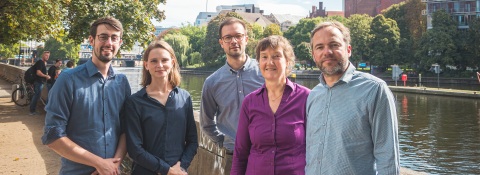
Meet the Team: Berliner Wasserbetriebe
January 5, 2023
From developing and refining analytical methods to detect industrial chemicals to the monitoring of wastewater treatment plants and urban runoff: The Berliner Wasserbetriebe (BWB) have many different tasks within PROMISCES. In this interview, we talked with BWB not only about their tasks but also about their goals, the project and how they are helping to improve the safety of drinking water ressources.
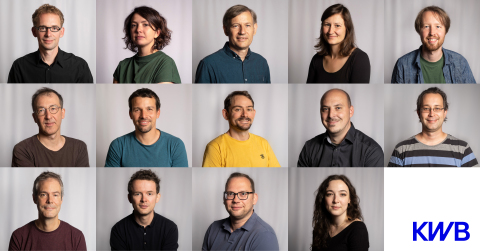
Meet the Team: Kompetenzzentrum Wasser Berlin gGmbH
December 6, 2022
KWB is the leader for Work Package 4, but is also involved in many other Work Packages.Their goal is to improve understanding of the fate and transport of the compounds in urban water cycles - not only for Berlin, but also for other cities with semi-closed water cycles or cities that want to reuse water.





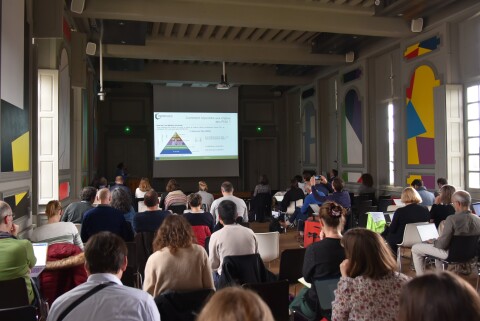
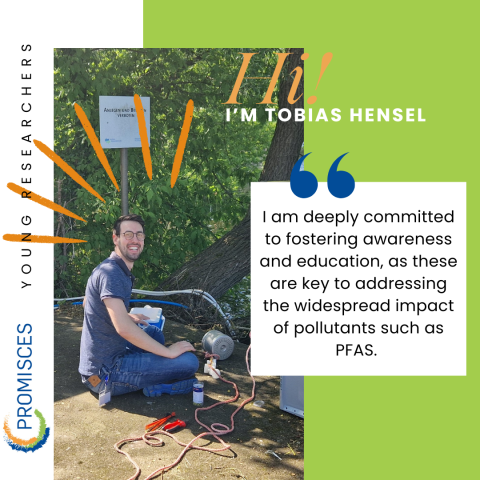

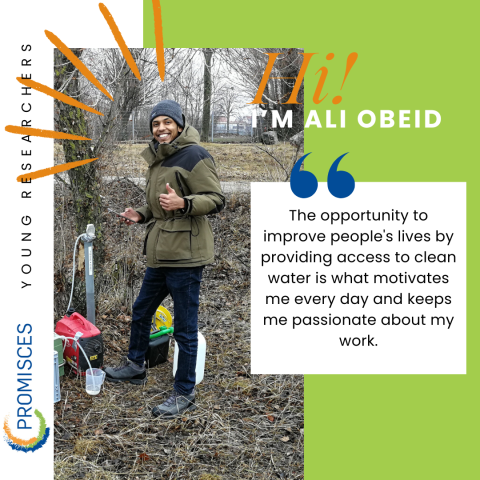
.png)